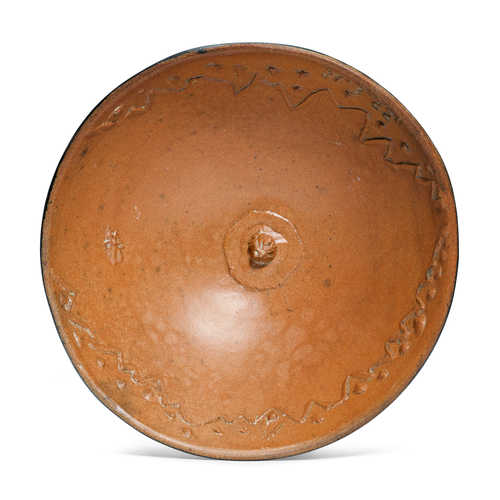
Lot 3616 - A187 Prints & Multiples - Saturday, 08. December 2018, 10.30 AM
PABLO PICASSO
(Málaga 1881–1973 Mougins)
Le sein. 1955.
Bowl. Red ceramic with relief and black glaze on the underside. From the edition of 100. Diameter 17 cm. On the underside with stamps: MADOURA PLEIN FEU and EMPREINTE ORIGINALE DE PICASSO.
Catalogue raisonné:
- Ramié, no. 272.
- Bloch, no. 58.
“He plunged into ceramics with the same passion as in painting, sculpture and printing.” Daniel-Henry Kahnweiler
For Pablo Picasso to be an artist meant to create art, to produce form, to be creative, and so for him it was never a question as to whether his ceramic work was equated with his paintings, drawings, sculpture and printed work. The ceramics offered him on the one hand a new arena of creative activity, in which he could try out new techniques, motifs and methods. On the other hand, he was able to create “art for everyone”. By the end of the 1940s he was already a prestigious artist, able to live well from his art. At the same time, however, Picasso was a staunch Communist and wished not only to reach a narrow well-to-do strata of society with his art, but to offer everyone the possibility of owning “a Picasso”. Ceramics offered him this opportunity.
On a visit in 1946 to the annual ceramics exhibition in Vallauris with his friend Louis Fort, he met Georges and Suzanne Ramié of the Madoura ceramics workshop. They invited him to visit their factory, where he made three ceramic pieces. Fascinated by the result, between 1947 and 1971 he produced around 600 further ceramic objects at Madoura. All kinds of everyday object – vases, jugs, ashtrays, plates, bowls and entire services – as well as sculptures and portraits were produced by the artist with the help of Suzanne Ramié. The motifs were typical of the Spanish painter – portraits, bullfight scenes, animals and figures from mythology – and both in terms of form as well as colour they are striking for their gaiety and light-heartedness.
Pablo Picasso bought Villa Galloise, near Vallauris and regularly visited the ceramics workshop. Here he also met the saleswoman Jacquline Roque, who would become his companion until his death in 1973.
CHF 1 000 / 1 500 | (€ 1 030 / 1 550)
Sold for CHF 1 750 (including buyer’s premium)
All information is subject to change.


